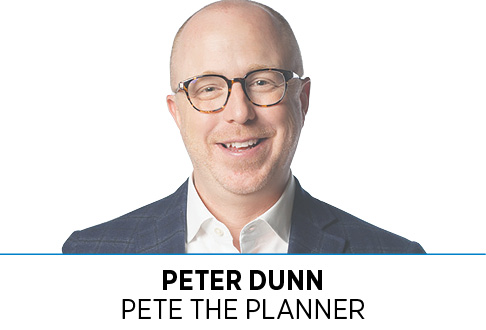Subscriber Benefit
As a subscriber you can listen to articles at work, in the car, or while you work out. Subscribe NowI’ve just changed financial advisers again, and I already feel like I’ve made a mistake. Years ago, I was with a financial adviser who only put me in ETFs, and anytime I mentioned a stock to him, he resisted having us invest in it. I left him for a different adviser who was very stock-heavy, but he had me in options and other things that didn’t work out, because I didn’t understand them. Now my new adviser wants me in various currencies and alternative investments. I don’t want to do that, either. Should I just do all this myself? A fourth adviser in 15 years seems bad.
—Ron, Zionsville
In a way, it feels like you’ve just described the 96th and Allisonville intersection (re)design process over the last 15 years.
Just so you know, this is one of those columns in which, at some point, I end up blaming you. I know. I know. But once the sting wears off, you’ll be in a better position than you were before you pressed send on your email. For what it’s worth, I won’t take any pleasure in pointing out all the things you should have done differently.
This is a rather simple case of not knowing what you want. I know this because at no point in your email did you mention performance. You weren’t upset with the ETF (exchange traded fund) adviser because he underperformed. You found yourself upset because the two of you didn’t align on what success looked like. To be fair, far too many investors don’t set return goals, and this leads to all sorts of problems. The adviser shares blame here, too.
I think you got bored and wanted more excitement in your portfolio. Again, this is an incredibly common sentiment. However, while I’m not offering you empirical data, the more boring a portfolio is, the more I like it. And there aren’t too many investments more boring than ETFs. Because you didn’t have a return goal (for example, a 10% annual return), you got bored and generated unhelpful ideas.
Then you got upset that your adviser didn’t like your ideas. This alone is a wildly confusing conundrum. You pay the man, and isn’t the customer always right? Not in my experience.
Imagine calling a chef out to the dining room and asking, “Have you tried putting Nutella on that Caesar salad?” Yes, your ideas matter, but only up to a certain point. I know this is a controversial perspective, but, at some point, your ideas work against you, and a good adviser is not interested in being a part of that. This is what happened with your first adviser.
There were more lessons to learn from your second adviser, but many of those lessons you should have learned via your first adviser. You should have made sure you were on the same page as your adviser during the interview process. And if you didn’t view your first couple of meetings with that adviser as an interview process, well, there’s a bonus lesson for you. You also should have aligned on goals. This is most easily accomplished with an investor policy statement. The IPS will lay out your goals, risk tolerance, investment objectives and so much more.
To be fair, your adviser probably shouldn’t have introduced you to options and other things you don’t understand. Options can be part of a more sophisticated investment portfolio, and the inclusion of options requires a savvy investor.
As for your third adviser, it sounds like you made the same mistakes as you did with your second adviser. If I were a betting man, I’d wager you expressed to both your second and third advisers a desire to be more active and/or innovative with your investments.
Based on what you shared with me, you should absolutely not manage your entire portfolio by yourself. And you should stop viewing advisers as disposable. I think you need a heinously boring investment adviser, who keeps it very simple.
This will require you to interview a handful of advisers, agree on an ISP and stay disciplined. If you simply must make speculative investments, take a very small amount of money—about 5% of your total portfolio—and do it on your own. Don’t try to taint your adviser-managed portfolio with your ideas.•
__________
Dunn is CEO of Your Money Line powered by Pete the Planner, an employee-benefit organization focused on solving employees’ financial challenges. Email your financial questions to [email protected].
Please enable JavaScript to view this content.


Great advice, Pete! I’d like to hear how Ron responded to your critique, if he did, in a follow-up article…